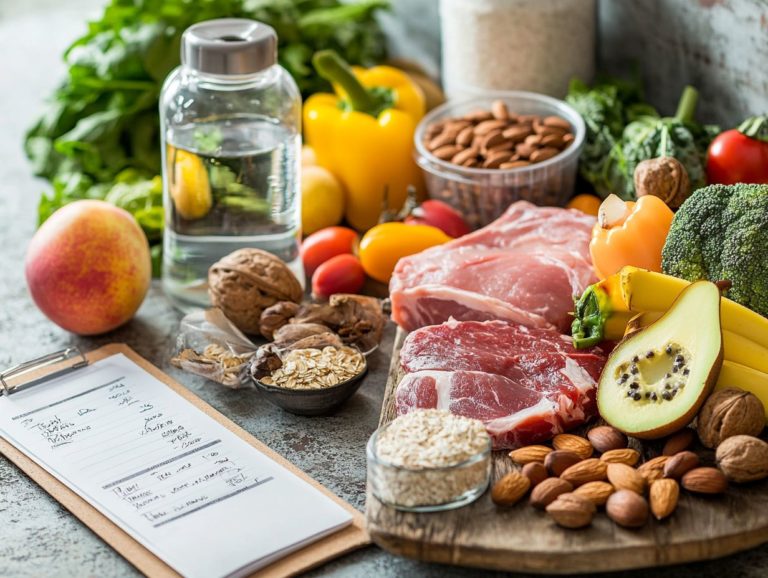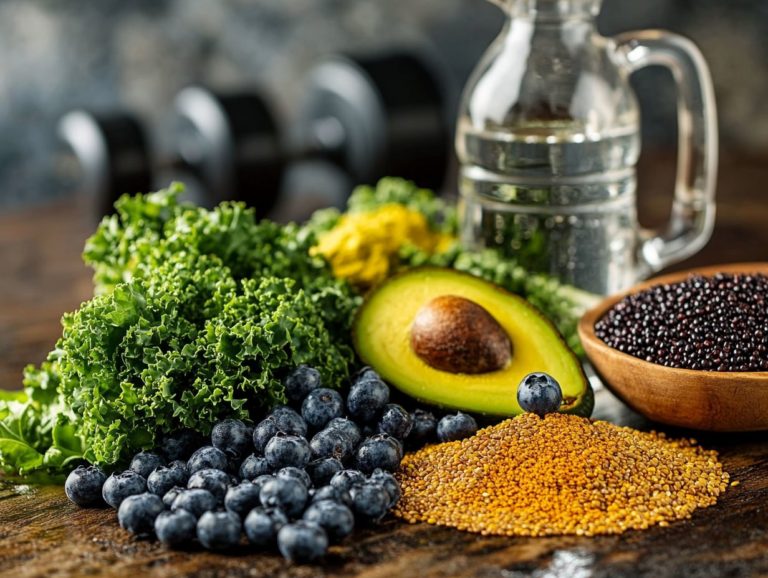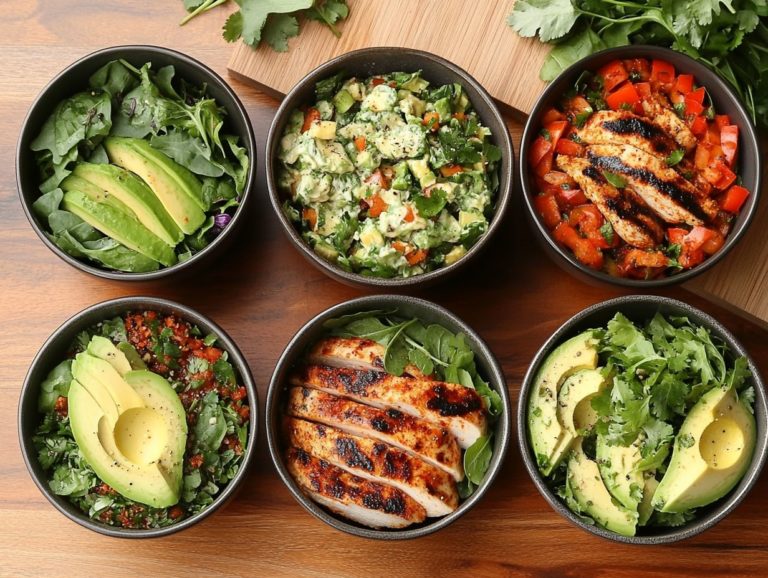Nutrition for Plant-Based Diets: Nutrient Sources
Curious about plant-based diets and how to ensure you’re getting all the essential nutrients? This article delves into everything you need to know, from pinpointing key sources of protein, iron, calcium, vitamin B12, and omega-3 fatty acids to offering practical meal planning tips and recipe ideas.
It also explores when and how to consider supplementation, along with strategies to recognize and address potential nutrient deficiencies. By the end, you’ll be equipped with the knowledge to truly thrive on a plant-based diet!
Contents
- Key Takeaways:
- Key Nutrients for Plant-Based Diets
- Incorporating Nutrient-Rich Foods into a Plant-Based Diet
- Supplementation for Plant-Based Diets
- Potential Nutrient Deficiencies and How to Address Them
- Frequently Asked Questions
- 1. What are some key nutrients that are commonly found in plant-based diets?
- 2. Can plant-based diets provide enough protein?
- 3. Are there any plant-based sources of calcium?
- 4. What are some good sources of healthy fats in plant-based diets?
- 5. How can I make sure I am getting enough iron in a plant-based diet?
- 6. Are there any essential nutrients that are lacking in plant-based diets?
Key Takeaways:
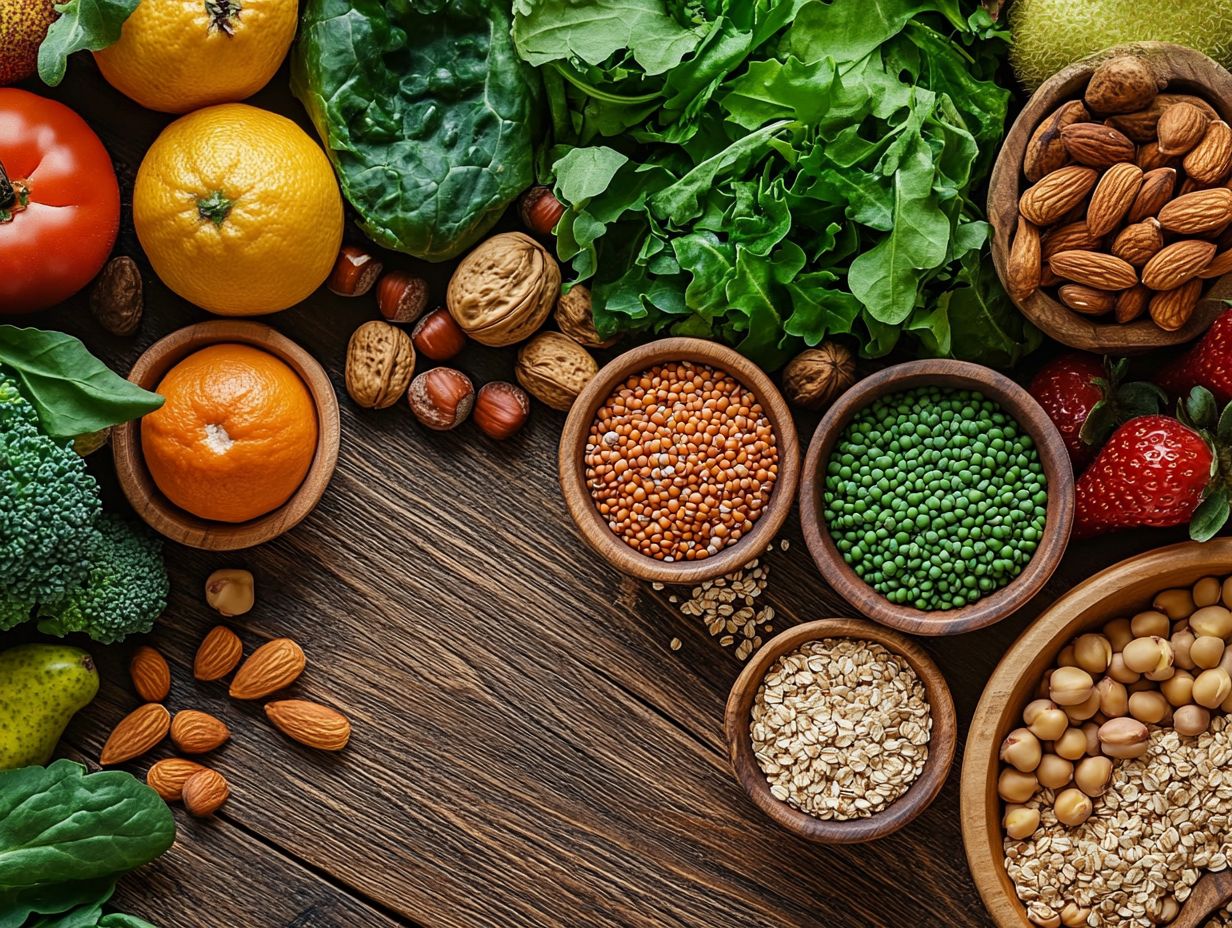
- Plant-based diets are rich in essential nutrients as long as a variety of sources are incorporated, including protein, iron, calcium, vitamin B12, and omega-3 fatty acids.
- Meal planning and recipe ideas help include healthy foods, like beans and legumes for protein and leafy greens for iron and calcium.
- Supplementation may be necessary for certain nutrients, such as vitamin B12. Always consult a healthcare professional to avoid potential deficiencies.
What is a Plant-Based Diet?
A plant-based diet invites you to embrace whole plant foods. This includes a vibrant array of fruits, vegetables, legumes, nuts, and whole grains, while minimizing or excluding animal products.
It’s not just about cutting out meat it’s an exciting way to boost your health! By incorporating nutrient-rich foods, you enhance your overall well-being.
As more individuals pursue healthier eating patterns, understanding and implementing a plant-based diet has become essential. This lifestyle elevates your health, reducing the risk of chronic diseases and boosting your energy levels.
It also promotes environmental sustainability. Adopting a vegan diet embodies ethical considerations, fostering compassion toward animals and encouraging a more responsible approach to food consumption.
The benefits extend beyond personal health; they include a lower carbon footprint and conservation of precious resources. This holistic approach to healthy eating resonates with those who aspire to achieve both wellness and planet-friendly practices.
Key Nutrients for Plant-Based Diets
Understanding the key nutrients essential for a plant-based diet is crucial for meeting your nutritional needs and fostering a healthy vegan lifestyle. Thoughtful planning ensures you get all the vitamins and minerals vital for your health.
This is especially important as you follow dietary guidelines tailored to various lifestyles and restrictions.
Protein Sources
Plant-based protein sources are diverse and plentiful. You can easily incorporate sufficient protein into your vegan diet without relying on animal products. Consider legumes, such as beans and lentils, alongside nuts, seeds, and whole grains.
Legumes provide both protein and fiber, promoting digestive health while keeping you full. Nuts and seeds bring healthy fats to the table, boosting nutrient absorption and providing much-needed energy.
Whole grains like quinoa and brown rice round out your options, offering complex carbohydrates vital for sustained energy levels.
To achieve a well-rounded amino acid profile, which are the building blocks of proteins, combine these protein sources. Pairing beans with rice is a classic example; it not only satisfies your hunger but also ensures you receive all nine essential amino acids, making your meal nutritionally complete.
Iron Sources
Iron is an essential mineral for producing red blood cells and maintaining overall health. If you re following a plant-based diet, you ll find plenty of iron sources, but enhancing iron absorption is key. Leafy green vegetables, legumes, and fortified breakfast cereals are fantastic options. Pairing them with vitamin C-rich foods helps your body use iron more effectively.
Add fruits like oranges, strawberries, and bell peppers to your meals. This combination maximizes iron absorption! Don t overlook nuts and seeds, either. Options like pumpkin and sunflower seeds not only provide iron but also healthy fats, making them a perfect snack choice.
If you re committed to a plant-based approach, consider soaking or sprouting grains and legumes. These methods can enhance their mineral content and aid digestion. By being mindful of your food combinations, you can optimize your iron intake and support your overall wellness and energy levels.
Calcium Sources
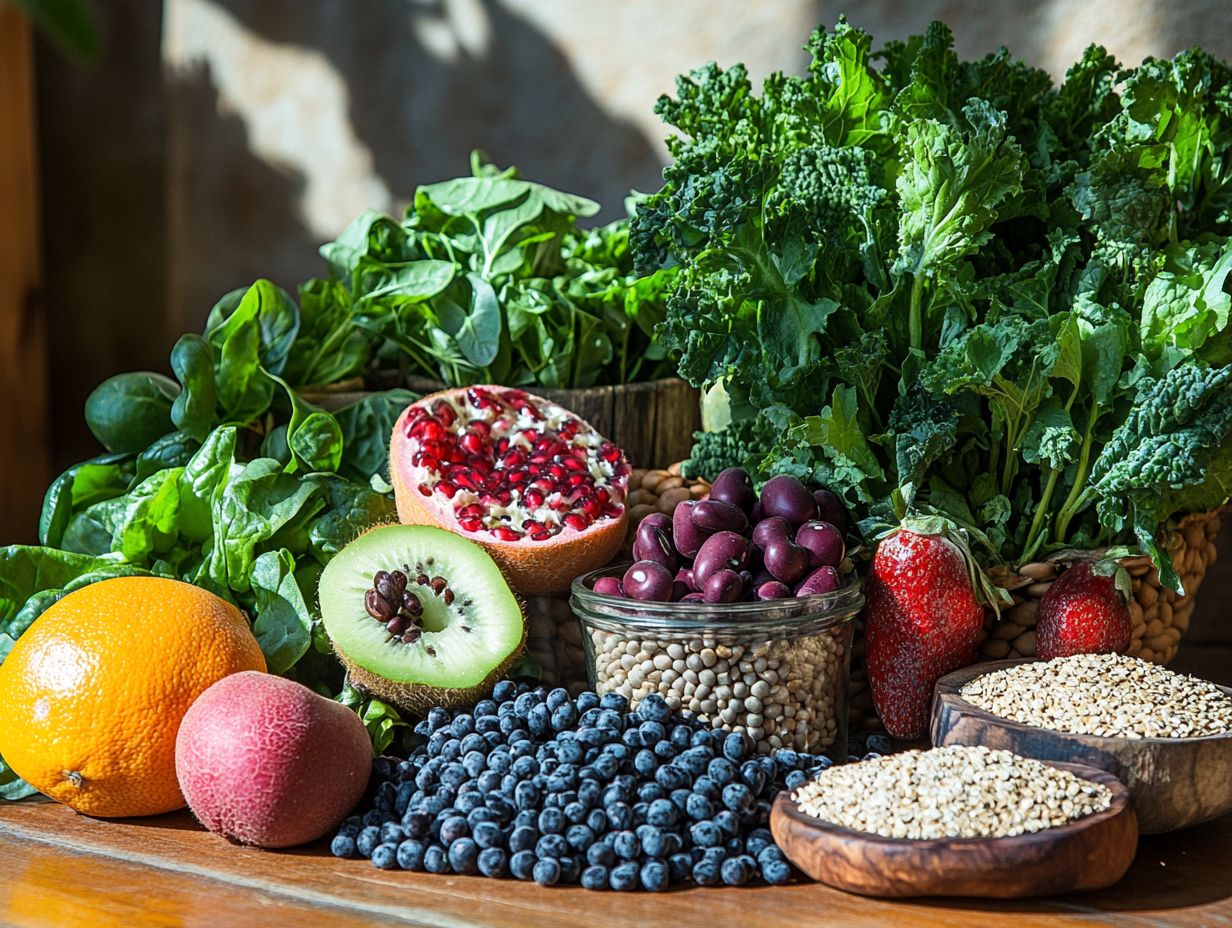
Calcium is essential for maintaining strong bones and overall health. A well-rounded plant-based diet offers a treasure trove of calcium-rich options. Include a diverse range of foods, such as leafy green vegetables and fortified dairy alternatives, to prevent nutrient deficiencies.
Incorporating a variety of calcium sources into your meals elevates the nutritional quality of your diet while introducing enticing flavors and textures. Options like almonds, tofu, and chia seeds boost your calcium intake and add unique tastes to your culinary creations. Many fortified dairy alternatives, such as almond milk and soy yogurt, are enriched with calcium, making them a convenient choice.
Enjoy a balanced diet packed with flavor while supporting your bone health!
Vitamin B12 Sources
Vitamin B12 is critical for your health make sure you seek reliable sources. This nutrient is naturally found in animal products, but you can easily obtain it through fortified foods or supplements as part of your dietary strategy.
This powerhouse vitamin is vital for maintaining nerve function, producing red blood cells, and supporting DNA synthesis. If you re embracing a vegan lifestyle, you may need to plan to ensure you get enough B12, as deficiencies can lead to fatigue and neurological issues.
Incorporate fortified cereals, plant milks, or nutritional yeast into your meals to meet your nutritional needs. Consulting with a healthcare professional can provide personalized guidance on supplementation, ensuring this essential nutrient remains a staple in your diet.
Omega-3 Fatty Acid Sources
Omega-3 fatty acids are vital for your heart health and cognitive function. While they re often linked to fish, a world of plant sources is waiting for you to explore. Nuts and seeds, especially flaxseeds, chia seeds, and walnuts, are excellent providers of these beneficial fats, fitting seamlessly into a healthy vegan lifestyle.
Incorporating these nutritious foods into your meals enhances cardiovascular health, reduces inflammation, and boosts brain function. If you re following a vegan diet, don t overlook options like hemp seeds and algae-derived supplements, which offer great alternatives to traditional omega-3 sources.
When you effectively include these plant-based options in your diet, you might enjoy improved mood and mental clarity, along with joint health benefits. A balanced diet rich in omega-3s supports your physical health and enhances your emotional and mental well-being, making it an essential part of any holistic wellness plan.
Explore more about plant-based nutrition and consider consulting with a nutritionist for personalized advice!
Incorporating Nutrient-Rich Foods into a Plant-Based Diet
Incorporating nutrient-rich foods into your plant-based diet is crucial for achieving a well-rounded intake of essential nutrients and enhancing your overall health.
Engaging in effective meal planning and exploring diverse cooking methods helps you include a broad range of fruits, vegetables, legumes, nuts, and whole grains. This ensures you meet your dietary needs.
Meal Planning and Recipe Ideas
Meal planning serves as an essential pillar for maintaining a successful vegan diet. It encourages you to weave nutritious foods into your daily meals. With thoughtfully crafted recipe ideas that showcase plant-based ingredients, you can create balanced dishes that cater to your taste buds and nutritional needs.
Incorporating seasonal fruits and vegetables elevates flavor and keeps your meals vibrant year-round. Don t miss out on the benefits of including whole grains, legumes, and healthy fats for a delightful spectrum of flavors and textures.
For example, consider a hearty quinoa salad adorned with chickpeas and a zesty lemon-tahini dressing. This provides essential protein and fiber in every bite. As you plan your week, think about batch cooking staples like lentils or brown rice, which means preparing large amounts of food at once for quick assembly of wholesome dishes.
This strategy minimizes food waste while maximizing nutrition, ensuring each meal is both satisfying and nourishing.
Supplementation for Plant-Based Diets
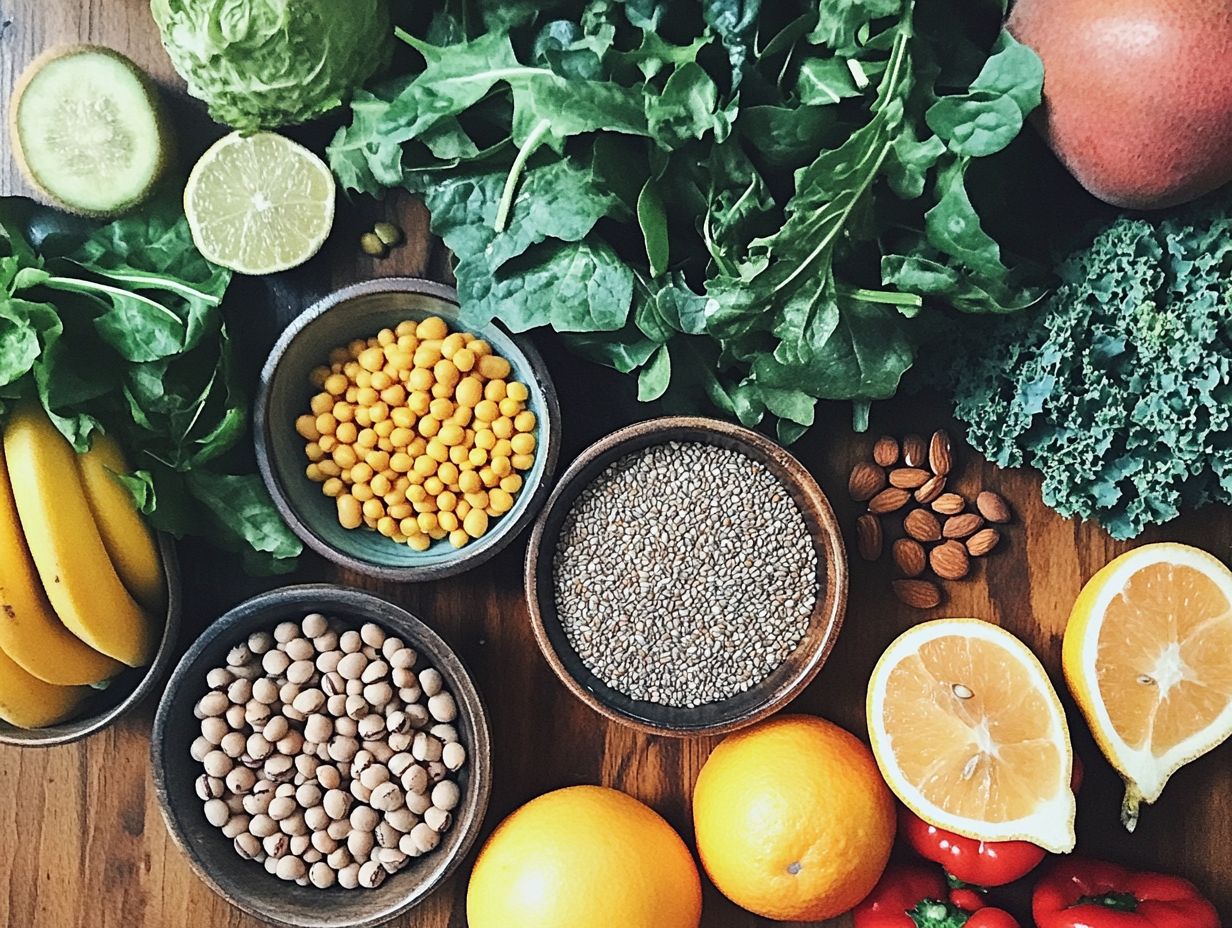
Supplementation is essential for meeting your nutritional needs while following a plant-based diet. This is especially important for nutrients that might be scarce in plant sources.
By adhering to dietary guidelines and incorporating vitamin supplements, you can tackle potential nutrient deficiencies, fostering a healthier lifestyle.
When and How to Supplement
It s important to know when and how to supplement while following a plant-based diet. This can greatly affect your overall health and well-being. By identifying your specific nutrient needs through dietary planning, you can find the optimal moments to introduce supplements and choose the most effective forms for maximum absorption.
If you’re engaging in rigorous physical activities, you may need higher levels of protein, iron, or vitamin B12. If you have dietary restrictions like gluten intolerance or nut allergies, you must pay extra attention to your nutrient intake.
Daily supplementation can often align with your meals; taking fat-soluble vitamins alongside nutritious fats enhances absorption. Consider your age, gender, and stress levels when crafting a personalized supplementation plan.
The right supplements not only bolster your physical health but also contribute to your overall vitality. It s vital to consider these elements as you embark on your plant-based journey.
Potential Nutrient Deficiencies and How to Address Them
Recognizing potential nutrient deficiencies is crucial for your health on a plant-based diet. Certain nutrients, such as vitamin B12 and iron, can be more elusive.
By adopting targeted dietary interventions and emphasizing health promotion, you can effectively tackle these deficiencies and ensure your nutrition remains optimal.
Identifying and Correcting Deficiencies
Identifying and correcting nutrient deficiencies is crucial for maintaining optimal health while following a plant-based diet. Neglecting these deficiencies can lead to serious health issues, so it’s essential to address them proactively.
By adhering to dietary guidelines and assessing your nutritional needs, you can make informed choices that effectively replenish your nutrient stores.
The first step in this journey is evaluating your dietary intake. You can accomplish this through food diaries, nutrition apps, or consultations with a healthcare professional whatever suits your style best.
Some specific nutrients to keep an eye on include:
- Vitamin B12
- Iron
- Omega-3 fatty acids (healthy fats that are good for your heart)
- Calcium
Adding fortified foods, like plant milks or cereals, and considering supplements when necessary can help bridge these gaps. Personalized dietary planning is essential; what works for one person may not suit another.
Understanding your unique lifestyle factors and preferences is key to achieving long-lasting health benefits within a plant-based framework.
Frequently Asked Questions
1. What are some key nutrients that are commonly found in plant-based diets?
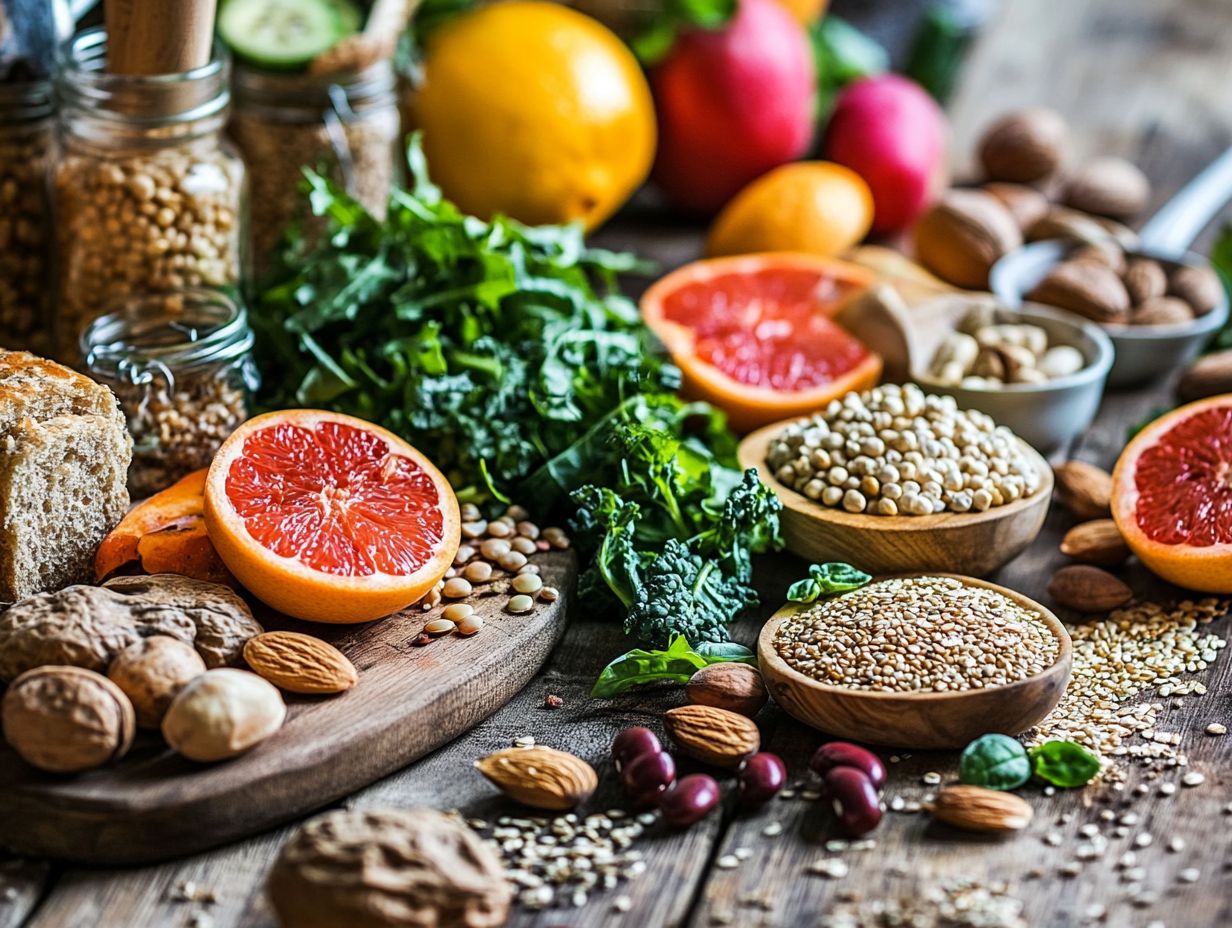
Some key nutrients in plant-based diets include protein, fiber, vitamins, minerals, and healthy fats.
2. Can plant-based diets provide enough protein?
Yes, plant-based diets can provide enough protein through sources such as beans, lentils, tofu, nuts, and seeds. Combining different plant-based proteins can also ensure adequate intake.
3. Are there any plant-based sources of calcium?
Yes, there are many plant-based sources of calcium, including leafy greens, fortified plant milks, tofu, and fortified cereals.
4. What are some good sources of healthy fats in plant-based diets?
Healthy fats in plant-based diets can be found in sources such as avocados, nuts, seeds, and plant oils like olive oil and coconut oil.
5. How can I make sure I am getting enough iron in a plant-based diet?
Iron can be found in plant-based sources like dark leafy greens, beans, lentils, and fortified cereals. Consuming vitamin C-rich foods can also aid in iron absorption.
6. Are there any essential nutrients that are lacking in plant-based diets?
Plant-based diets can lack certain nutrients, such as vitamin B12 and omega-3 fatty acids. Make sure to add fortified foods or consider supplements to stay healthy!

